Gender-responsive socioeconomic indicators boost natural resource management in Ethiopia
28 February 2023
The RFS Monitoring & Evaluation (M&E) process tracks country project, Regional Hub and programme-wide impact. At the programmatic level, RFS tracks progress towards Global Environmental Benefits (GEBs), environmental and biophysical targets, and food security and household resilience indicators. M&E data is used to regularly assess progress and enable informed decision-making within country projects.
When resources are allocated to development projects and programmes in the agriculture, natural resources, and environment sectors, it is essential to know if the project or programme has achieved its intended impacts and reached targeted beneficiaries. M&E systems help RFS country projects, and the programme as a whole, track progress and performance against indicators related to household income, natural resource management, climate change mitigation, biodiversity and food security.
M&E systems are often challenged by poor design and implementation stemming from a number of challenges. A lack of reliable baseline data gathered early in project lifecycle often prevents projects and programme from accurately gauging impact. Even well-designed M&E systems are challenged by poor operationalisation, often due to a lack of capacity, resources, or technology to implement over-ambitious data collection and analysis requirements. The lack of integration of M&E systems into day-to-day programme management, and broader policymaking and decision-making processes, often results in M&E systems that fail to operate as meaningful decision support tools or adapt to changing contexts.
Well designed and executed M&E systems can lead to effective programmatic learning and adaptation. As one of the three GEF Integrated Approach Pilots (IAPs), RFS is developing and applying innovative approaches for implementing M&E processes, integrating data and showcasing accurate progress across a large integrated project. Ongoing M&E activities support RFS teams in tailoring and regularly adapting project activities to achieve the desire impact. The RFS M&E system is expected to evolve as the programme evolves, adapting to challenges as they arise and capitalising on new opportunities to improve project and programme performance.
In order to develop an adaptive and effective system that reflects the needs of all relevant sectors, RFS has promoted the use of multi-stakeholder processes for developing country project and programme-wide M&E systems. Including stakeholders from all relevant sectors in the development of M&E systems also ensures that M&E data will be integrated into the decision-making and policymaking processes of agriculture, environment, and natural resource ministries even after the project is completed. To further ensure sustainability of M&E outcomes, capacity development in the collection and analysis of data, as well as the use of innovative monitoring tools, has been a critical feature within each RFS project.
The Regional Hub is responsible for establishing a programme-wide M&E framework for tracking global environmental benefits and other outcomes of the programme. The Regional Hub has also played a central role in introducing country teams to innovative monitoring tools and solutions and building capacity within national institutions to apply appropriate tools and methodologies for their own project-level monitoring and evaluation.
In Ethiopia, the RFS country team has developed and is now utilising a web-based information management system for multi-scale monitoring of ecosystem services and global environmental benefits. In Kenya and Eswatini, country project teams are using IFAD’s Multidimensional Poverty Assessment Tool (MPAT) to carry out baseline household surveys on human wellbeing and water and land-use practices in project sites. In Nigeria, Conservation International’s Vital Signs initiative has trained local Monitoring and Evaluation Officers in the use of landscape monitoring tools to assess project sites and analyse geospatial data.
Explore the RFS Country Projects to see more examples of how RFS countries are implementing Monitoring & Evaluation activities.
Stories from the Field
Explore our stories from the field to learn more about how RFS country project teams are implementing activities related to the programmatic theme of Monitoring & Evaluation.
Relevant resources
We have a growing library of reports, briefs, case studies, media, tools and guidelines. Explore all resources related to Monitoring & Evaluation to get greater insight into our programme activities.
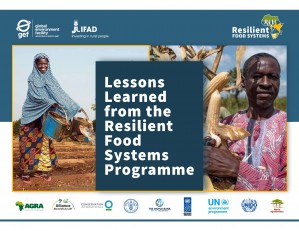
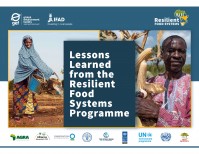
Integrated Approach Pilot (IAP) programmes were conceived as part of the Global Environment Facility (GEF) 2020 Strategy to test the delivery of integrated approaches that address discrete, timebound, complex, global environmental challenges. In its Sixth Replenishment Cycle (GEF6), three IAPs were funded: Sustainable Cities, Taking Deforestation out of Commodity Supply Chains, and Fostering Sustainability and Resilience for Food Security in Sub-Saharan Africa, also known as the Resilient Food Systems (RFS) programme.
The RFS programme serves as an outstanding example of different partners and countries with distinct mandates joining forces to pursue a shared objective, leveraging their respective strengths to transform food systems in Africa. It highlights the significance of clearly articulating the programme’s vision, establishing a well-defined division of labour, and delineating roles and responsibilities from the outset, forming the foundation for an accountability framework. Moreover, the RFS underscores the importance of adopting a nexus approach that integrates food security, agriculture, environment, socio-economic, and climate considerations.
This holistic approach recognizes the interconnectedness of these sectors and the need for holistic solutions. The RFS’s systems-based approach brings together multiple partners at different levels and fosters information flows in both directions, supporting collaboration and knowledge sharing.
This publication presents some of the main lessons learned from the RFS programme, which lasted for six years between 2017 and 2023. It provides a reflection on the implementation, lessons learned, and observations around the key components of the RFS. The programmatic value-add of the RFS and the manner with which it was harnessed during implementation is conveyed through case studies drawn from the experience of the country projects across these components.
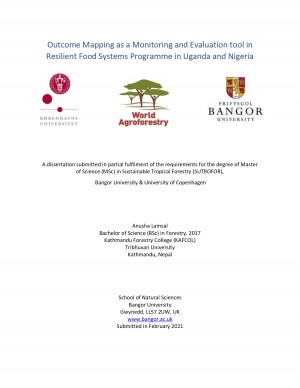
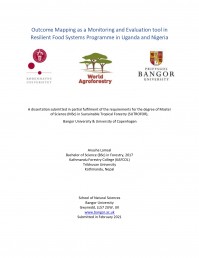
A dissertation submitted by Anusha Lamsal in partial fulfilment of the requirements for the degree of Master of Science (MSc) in Sustainable Tropical Forestry (SUTROFOR), Bangor University & University of Copenhagen.
ABSTRACT:
The Resilient Food Systems (RFS) programme aims to respond to chronic food insecurity and targets in fostering sustainability and resilience among smallholder farmers in 12 sub-Saharan African (SSA) countries. This research investigated the potential for OM methodology in the RFS project in the Karamoja subregion of Uganda and northern Nigeria. This qualitative study offered OM training sessions that trained the participants from both countries to identify project vision, mission, boundary partners, outcome challenges, progress markers, strategy maps, and organizational practices. The participants used OM methodology to track the behavioural change in the boundary partners involved in the RFS projects. Participants from both countries identified 4-5 important RFS project boundary partners that need behavioural changes and defined outcome challenges, progress markers and strategy maps for each of them. RFS Uganda identified Local Farming Communities (Smallholder farmers, women, and youth) who were also the ultimate beneficiaries, National Steering Committee, Local Government, Media, and the Implementing Partners as the most important BPs. Similarly, Smallholder farmers (women and youth), the Federal Ministry of Agriculture, ADPs of all 7 states, Private sectors, and Media were identified as the most important BPs by RFS Nigeria. This study concludes that OM methodology can be implemented to track behavioural changes in Boundary Partners involved in RFS projects. To incorporate tracking of behavioural change into the project monitoring and evaluation plan, it is important to configure and adjust OM methodology to the country’s specific contexts and phases of RFS projects. When continued in other RFS countries, it should incorporate gendered perspectives in every OM stage possible.
The data obtained during this thesis was mainly used to write this MSc dissertation. It was also used to contribute to a project report and research paper informing Uganda, Nigeria, and other RFS countries about project scaling and policy influence using OM as a method for Monitoring and Evaluation (M&E). This research contributes to the overall SSA Food Security and Sustainability Goals of the RFS as well as one of the objectives of ICRAF to address the Sustainable Development Goals (SDG) 2 aimed at ending poverty, achieving food security and improved nutrition and encouraging sustainable agriculture.
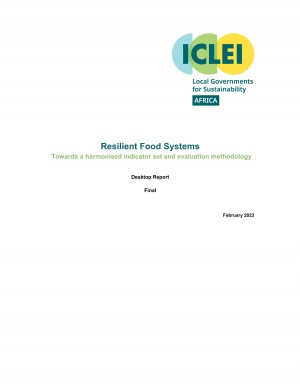
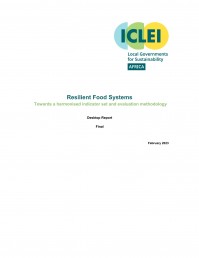
In the RFS programme, each country project collected its own set of resilience indicators. At a minimum, countries had to collect socio-economic and environmental data, however, the latter was the responsibility of Conservation International, which entails Global Environmental Benefits (GEB). The data collected at the country level were divided into household data, farm agriculture data, administrative/community groups management and market information. This Desktop Review provides a closing review of country project indicators.